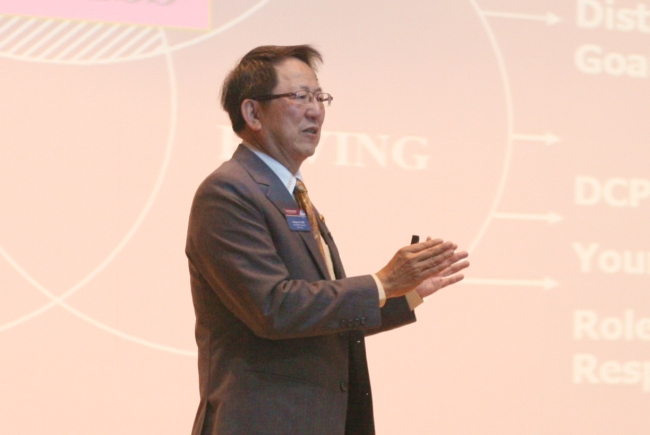Korea Toastmasters held its national conference on Saturday and Sunday, with key speeches from International Toastmasters president George Yen and former Toastmasters world public speaking champion Lance Miller.
The group is the local branch of Toastmasters, an international nonprofit organization with nearly 300,000 members that focuses on adult education in communication and leadership.
Almost 300 people attended the conference, up from 220 last year, according to conference chairperson Minju Lee. This reflects the organization’s growth in Korea, which officially became a district in July.
Toastmasters clubs had been run independently in Korea until 2008, limiting their potential, according to James Lim, Toastmasters Korea’s outgoing district governor.
Since then, the group has grown from 12 clubs to 45, with the number expected to rise further this year.
“Our target this year was 49, but if everything goes right we might have another 10,” said Lim.
Most of the clubs are run in English, but there are bilingual clubs, he said.
“It’s up to the person who wants to start one. I think some people want to start up a Spanish one, another wants to start up a German one,” he said.
But he said that there was a limit to the group’s use for developing foreign language skills.
 |
George Yen speaks at the Korea Toastmasters Spring Conference at the Seoul Women’s Plaza on Sunday. (Paul Kerry/The Korea Herald) |
“There is a bit of a misconception that Toastmasters is somewhere you go to learn a language. Toastmasters is more about using our language, so we want people who have a certain grasp of English or Korean or Chinese or whatever you want to do,” he said.
“We are all about communication, public speaking and leadership. In order to build on those you need to have a certain fluency. But there is no reason that that can’t be one of the reasons you want to join. … Improving your language is sort of like a biproduct.”
He said the group’s positive atmosphere helped him overcome his stutter and communicate better.
“It gives you certain skills and makes you calm down even and it makes you appreciate why you get nervous in front of people. And so you take that nervous energy and you use it,” he said.
“I find myself speaking better. I still fail loads of times, but the great thing is that nobody is there to bring you down and criticize you. They are all there to evaluate you, which is different, and to bring you up and make you a better person.”
As well as communication, Toastmasters coaches on leadership. It was on this that Yen focused his speech.
After building up a successful business when he emigrated to the U.S., Yen lost everything and returned to Taiwan.
Since then he has built up a new business, and credits his later success to Toastmasters. He said this turnaround came step by step, starting with self-confidence and communication.
The organization helped him appreciate the power of words and language, he said.
“How we use our words defines how we think. And how we think defines our reality and we can change our destiny,” he said after his speech.
He said that some things were easier to change than others. While shyness is relatively easy to work on, honesty is harder. But he said that it was difficult to say that some people lacked the potential for leadership.
“I wouldn’t make such a broad statement, because one of the things that I have learned in Toastmasters is that people think ‘no way, he or she’s not cut out for it.’ And then they turn out to be great leaders,” Yen said. “I must say I am humbled to be proven wrong, because we have a narrow definition of what a leader is supposed to look like.”
And it’s the leadership aspect of the group that makes Yen optimistic about its future.
“Toastmasters are about continuous education, lifelong education. And so our time has come. Communication and leadership are much more important,” he said.
“Today, when knowledge explosion is an understatement ― anything you need to know you can Google it ― what you need is how to think and how to communicate in writing or speaking. I can’t think of a better niche than that.”
By Paul Kerry (
paulkerry@heraldcorp.com)








